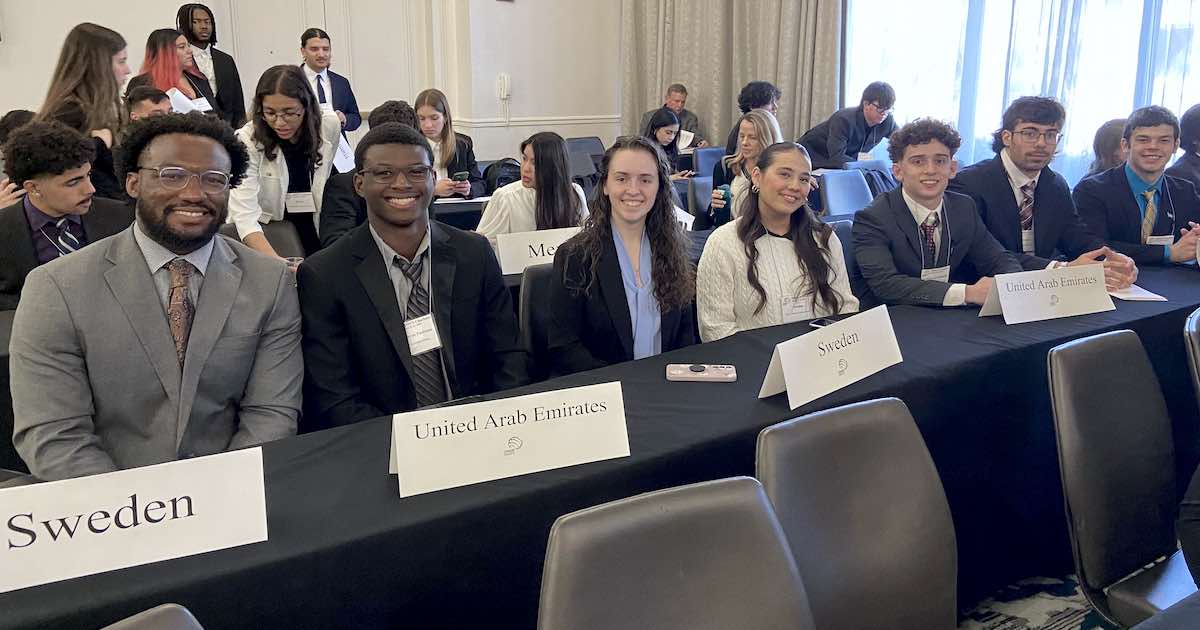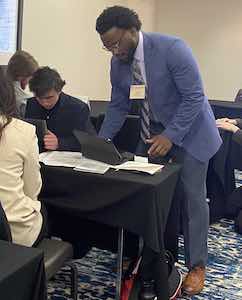Presbyterian College students participate in Model UN in Charlotte, N.C.

In today’s interconnected world, the influence of global politics seeps into every aspect of people’s lives, underscoring the importance of comprehending international dynamics to navigate our own journeys effectively.
To better understand those dynamics, a group of Presbyterian College students traveled last month to participate in the Southern Regional Model United Nations (SRMUN) conference in Charlotte, N.C., and delve into the intricacies of global diplomacy.
 Led by Dakota Price, a junior from Gilbert, and Malcolm Wiley, a senior from Tyrone, Ga., the group performed admirably and with the intent to build on past SRMUN conferences, where PC’s delegates earned two consecutive “Best Delegate” and “Best Position Paper” honors.
Led by Dakota Price, a junior from Gilbert, and Malcolm Wiley, a senior from Tyrone, Ga., the group performed admirably and with the intent to build on past SRMUN conferences, where PC’s delegates earned two consecutive “Best Delegate” and “Best Position Paper” honors.
This year’s revitalized Model U.N. team consists of mostly first-time delegates but is committed to maintaining the group’s standard of excellence. In fact, the team is plans to offer the same type of experience to high school students by hosting a future Model U.N. conference on the PC campus.
Club members reflected on their experiences this spring. Price, the president of the Model U.N. Club, participated in his first Security Council simulation – essentially navigating a crisis scenario.
“Engaging in this dynamic environment has equipped me with invaluable skills in adaptability and the formulation of positions on hypothetical issues,” he said.
Becca King, a freshman from Mountville, said her first Model U.N. was transformative.
“Speaking before hundreds of peers without a full script was daunting, yet I managed to effectively convey my point despite my nerves,” she said.
At PC, the Model U.N. is offered as a three-credit hour course, providing students with a comprehensive understanding of parliamentary procedure, global issues, diplomacy, and resolution writing.
Wiley and George Hopkins, sophomore from Columbus, Ga., said the class prepared them to “research and discuss the history and viewpoints of Member States along with how their governments operate when handling issues the country may face.”
Ana Mejia, a freshman from Simpsonville with Ecuadorian roots, said she values the diverse interactions with fellow delegates, underscoring the importance of global diversity and cooperation. Similarly, Josh Williams, a sophomore and military reservist from Columbia, views his exploration of international politics as a valuable asset for potential overseas deployment.
For many first-time delegates, their participation in the Model U.N. marks their first engagement in a formal setting, dressed in business attire. Trenton Dominguez, a sophomore from Harmony, Fla., said he was grateful for the support provided by Tartan Threads, a campus service offering business attire for formal occasions. Alongside Wiley, Hopkins, and other classmates, Dominguez is actively involved in organizing a fundraising event for Tartan Threads scheduled for April 23.
The Model United Nations offers a dynamic academic experience open to students of all majors, providing opportunities to hone public speaking, research, teamwork, and political skills in a competitive environment. Participants represent a United Nations Member State and engage in simulations based on various U.N. bodies.
